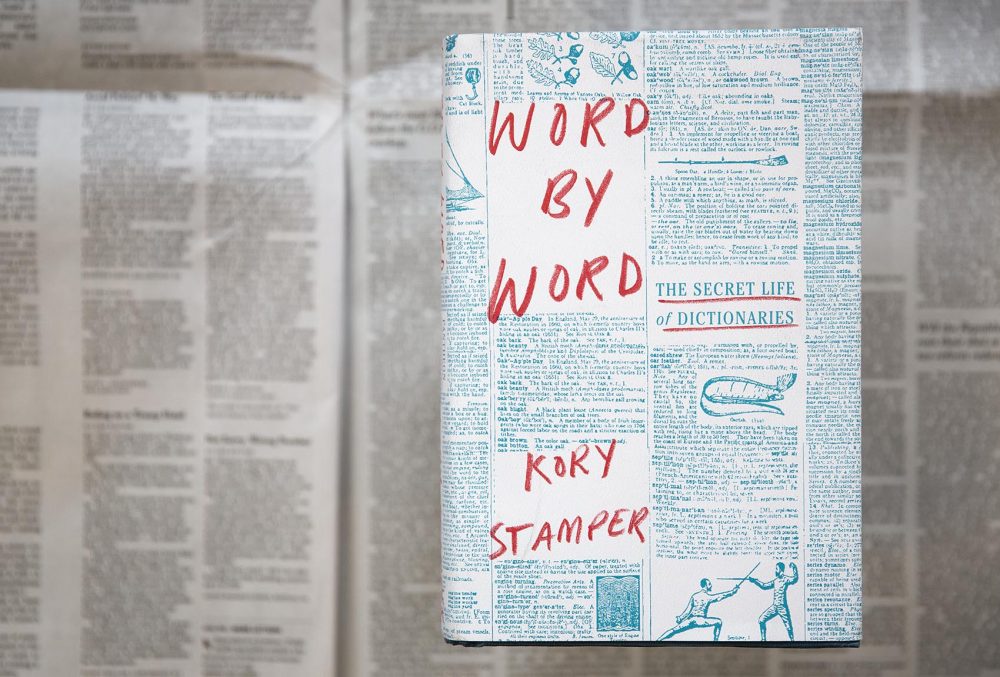Advertisement
In 'Word By Word,' One Merriam-Webster Editor Deconstructs The Dictionary
Resume
What goes into writing a dictionary? Merriam-Webster lexicographer Kory Stamper gives a behind-the-scenes look at the process in her new book “Word by Word: The Secret Life of Dictionaries.”
Stamper (@KoryStamper) joins Here & Now's Robin Young to talk about the book, and about how words like “irregardless” and “marriage” have caused ructions with readers over the years.
- Scroll down to read an excerpt from "Word by Word"
Interview Highlights
On how she became interested in lexicography
"It was a class on the Old Norse Icelandic family sagas, which is about as nerdy as you can get. Our professor was explaining how to say this word, and he said, ‘There's an odd sound at the end of this name that is called the voiceless alveolar lateral fricative.’ And I light up like a used car lot. I thought, 'I don't know what that is. Fricative, that sounds obscene. Lateral, that means you can aim it. Voiceless, but you say it.' So, that's the thing that really hooked me on language itself. Not just story, not just words, but language."
On English being a "whore of a language"
"English as a language has been stealing words from other languages pretty much since its inception. When we first started speaking the ancestor language of English, which is Old English, we were already stealing words from Latin, we were stealing words from Old Norse. In the high-middle ages, we were stealing lots of French words, and we started stealing Italian words. We've just always been a language that kind of sleeps around, and that's fine, and that's what makes English so beautiful and wonderful and also so frustrating for people who are trying to learn English as either their native language or as a foreign language. I have so much empathy and sympathy for people who are trying to learn English as a foreign language."
On her favorite and least-favorite words
"I collect weird words that I find when I'm proofreading dictionaries, which is a task I would wish on nobody. ... One of my favorites is 'gardyloo,' which is defined in one of our dictionaries as ‘a warning cry used in Edinburgh when throwing slops out the window.’
"To me, irregardless is just flat-out wrong. Because that's what I had been told my entire life. 'Ir-' that's taken from the word irrespective. And 'regardless' is regardless. So it's a blend of irrespective and regardless, and it means regardless. ... If you can believe it, this word that everybody has this very specific and vehement dislike of, gets used in print a ton. It ends up in edited prose way more than you would think. It goes back to the late-1700s, I think is where we've dated it at this point. It actually originated as an emphatic way to say 'regardless.' So people would say, 'Regardless of that and irregardless of the other thing.' That just kinda got flattened when it got into print."
On the response to the inclusion of "gay marriage" in the dictionary
"It was rough. This was one of these instances where people feel strongly about language because language is a cultural marker. And their concern was that the dictionary is supposed to be an arbiter of language, language is what expresses our culture, therefore the dictionary must be an arbiter of culture. And if you're going to enter this, then, 'The Supreme Court will refer to it, and the world is just gonna fall apart, and Noah Webster is spinning in his grave.' It was about three solid weeks of email. It was very rough, and because I had to say, we're not describing the thing, 'marriage,' we're describing a use of the word 'marriage.' And that seems like hairsplitting to a lot of people, but that's what lexicography is. We deal with words, not culture. Fortunately for everybody around us, because we're all really awkward nerds."
On her love of language
"Inside the office, we find it very collegial and very normal. People who visit find it very weird, 'cause it's a whole bunch of people sitting in cubicles very quiet, not talking to each other. Everyone who works there — and everyone who does lexicography — really does it because it's this beautiful puzzle, and you can't do this work and not love English somehow. Otherwise it would just drive you insane, because it's so tedious and so detail-oriented. But we really all sort of have this strong affection for this language that a lot of people feel is really unlovely and unlovable."
Book Excerpt: 'Word By Word'
By Kory Stamper
Excerpted from the book WORD BY WORD by Kory Stamper. Copyright © 2017 by Kory Stamper. Reprinted by permission of Pantheon.
This article was originally published on March 28, 2017.
This segment aired on March 28, 2017.